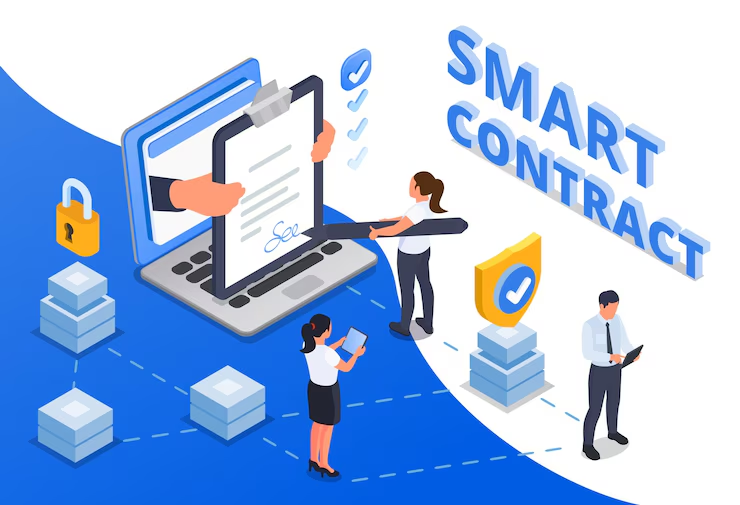The use of smart tools has grown rapidly in the world of finance. Every deal showcases the role of digital processes. The smart contracts system automates every step, creating a clear and easy path for users. This method removes manual errors. Rules are fixed in an automated form, ensuring no delays in the process. Smart contracts are based on fast and fair methods. Every process is completed through the system, ensuring transparency and security.
Data is secured and checked automatically. Firms use smart systems in their daily operations, strengthening trust and control. Records are saved automatically, and users get real-time updates. This approach makes deal processes smarter and removes the need for human intervention. Smart contracts almost eliminate fraud risks, with every policy rule-based. These tools have opened new possibilities in finance.
What are Smart Contracts?
A Smart Contracts is a code that works automatically with predefined rules. Deals are defined by a system that specifies the rights of all parties involved. This method is fast and reliable. Firms integrate their systems through smart code, ensuring data protection and auto-saving. This process minimizes costs and errors. The use of smart contracts is on the rise, and industries are adopting this tool. Rules are fixed to ensure transactions are fair and transparent. This digital method operates quickly, providing excellent results for users. Smart contracts are crucial in finance, providing clarity and seamless experiences.

Use in Bank Deals
Smart Contracts
Smart contracts have become widespread in banking. Accounts are automatically checked, and rules are present in the code. When conditions are met, the system activates.
Loan Automation
Loan and credit files are automated for Smart Contracts. Transactions are traceable, handled automatically by the bank’s staff. The system makes the process transparent and clean.
Secure System
Users enjoy secure services, with files updated and protected. Banking processes are shorter, smarter, and fraud-resistant. Transaction evidence is preserved, and records are saved automatically.
Clear Rules
Terms are definite and fair, saving time. The banking industry is now embracing smart contracts, which add transparency and reliability. Transactions are efficiently handled.
Use in Loan System
Loan rules are clear and fixed. Smart contracts automatically verify each term, making the process fast and accurate. When the file is ready, the system approves it without delay. Every step is documented with proof. The system ensures fairness, with files tracked automatically. The loan process becomes transparent and error-free. Each transaction is managed accurately, benefiting lending firms.

Smart Contracts Use in the Insurance Sector
Claims in the insurance sector must be fair. Smart contracts automatically check files, approving claims when conditions match. Users don’t need to wait, as policies follow smart rules. Claims are automatically tracked, eliminating fraud risks. Smart contracts offer an efficient and secure system for insurance firms. Policies store data automatically and match rules in the file. Users feel safe, with each step securely saved. Insurance companies are increasingly using smart tools to process claims and prevent fraud.
Use in Commercial Transactions
Smart contracts are a popular choice in trade finance. Shipment and delivery steps are automatically verified. The system provides fraud protection, with each file tracked. This tool saves time and effort. The process is rule-based, making trade smoother and faster. Smart tools ensure clear records, with every deal processed through smart code. They have become integral to the commercial sector, improving shipment tracking and payment processing. Both parties enjoy a seamless experience.
The Role of Smart Contracts
Smart contracts function seamlessly with smart tools. Files go through an efficient, clear process, with data tracked automatically. Rules are checked, and each code is fixed. These tools make the system reliable and secure. Every firm uses smart contracts, enhancing trust. Updates are released automatically, ensuring transparency. Records are secure and accurate in smart contracts is secure transactions. Each process is automated, simplifying tasks and reducing manual input.
smart contracts is secure transactions smart contracts is secure transactions
The main feature of smart contracts. Every transaction is private, with rules checked automatically. Data is saved automatically, and rights are protected. Smart systems build trust by tracking files and ensuring safe steps. User information remains confidential, protecting privacy. Transactions are monitored at every step, reducing fraud and errors. Each file is tracked to ensure transparency.
Defect-Free System
- Files are checked without manual work through smart contracts that follow preset rules. Every entry is read by the system automatically to avoid delays and mistakes.
- Conditions are matched through coded rules written inside the contract, and once met, the system activates without human help.
- System activates with no human delay which removes errors and makes banking processes smooth and clear for both users and staff.
- Business runs fast and smooth with no mistakes because smart tools complete each process automatically and store every track record safely.
Data Safety
Data is securely stored in the smart contract system. Steps are tracked, and user data is protected. Privacy is maintained, with smart code safeguarding data. Files are traceable, and updates are preserved. Transactions are logged effectively, maintaining data integrity. Strong security, protecting business operations by data.
Time-Saving Advantage
Smart contracts save time. Every step is automated, eliminating manual work. Processes are fast, with approvals and file verifications done quickly. Smart tools complete tasks faster, improving efficiency. Every step is easy to follow, and the process is quick. This increases efficiency and makes optimal use of time.

Cost Control of Smart Contracts
Smart contracts reduce costs by minimizing manual work. Personnel and paperwork costs are cut, and the system operates automatically. Operational expenses decrease, improving business efficiency. cost-effective, providing long-term savings by smart contracts.
Legal Framework
Legal cover is essential for each system. Smart contracts should be clear and consistent. Firms must follow local laws and regulations. Legal teams verify smart systems to ensure secure processes. Every rule must be legally backed, ensuring compliance. Legal compliance ensures smooth, reliable operations for firms.
Risk Factors
Smart contracts are vulnerable to bugs. A flaw in the code can cause a deal to fail, so systems need robust development and testing. Risks must be monitored, and each contract should be thoroughly reviewed. Continuous monitoring ensures business continuity.
Technical Approximation
Smart contracts require a strong system to function. Weak systems may fail, causing slowdowns under high loads. Tech support is crucial for smooth operation. Each step must be optimized for efficiency and speed. Smart contracts are used with high-tech infrastructure to enhance efficiency.
Final Thought
Smart contracts represent the future of finance. Firms are adopting this tool, making deals smarter and more efficient. Every deal is processed through smart code, securing and speeding up each step. These tools have become popular across sectors, ensuring reliability and security. Smart contracts are essential for a smart future, encouraging firms to upgrade their systems.


1 Comment
Pingback: Top 10 New Laptops to Buy in 2025 for Work, Study, and Gaming - Tech Funds